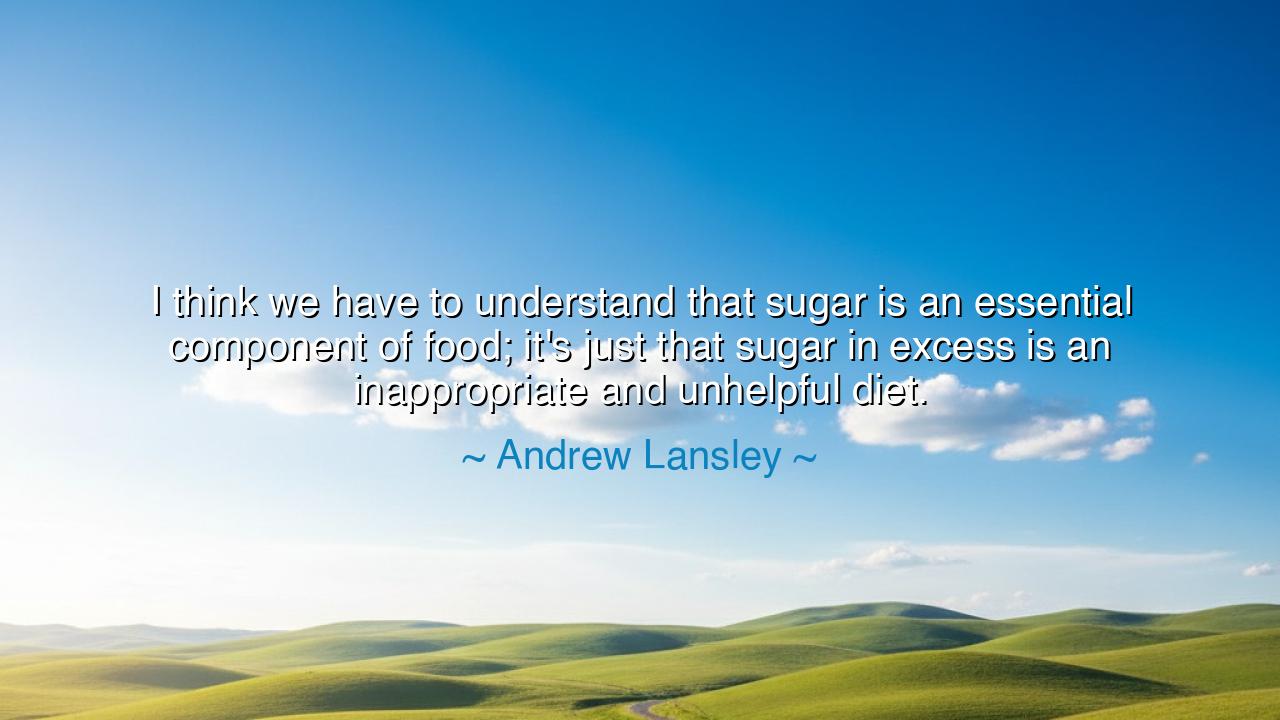
I think we have to understand that sugar is an essential
I think we have to understand that sugar is an essential component of food; it's just that sugar in excess is an inappropriate and unhelpful diet.






In the intricate dance of life, where the body and spirit are intertwined, there is an essential truth that resonates through the ages. Andrew Lansley offers us a key insight into the nature of nourishment when he says, "I think we have to understand that sugar is an essential component of food; it's just that sugar in excess is an inappropriate and unhelpful diet." These words carry profound wisdom, for they speak to the balance that must exist in all things, particularly in our relationship with food. Sugar, in its proper measure, is not the enemy; rather, it is the excess, the unrestrained indulgence, that brings harm.
Consider, children, the ancient teachings of the great Greek philosophers, who understood that all things, even the most basic elements of life, must be approached with balance. Hippocrates, the father of medicine, once said, "Let food be thy medicine and medicine be thy food." In this, he reminds us that food is not merely sustenance; it is medicine—a tool for preserving our health. Yet, just as Hippocrates advised moderation in all things, so too did he understand that even the simplest foods, like sugar, can be beneficial when consumed mindfully. It is in excess that sugar becomes the force that drags us toward imbalance and disease.
In Rome, the wisdom of Cicero echoed this very idea. Cicero spoke often about the importance of moderation, not just in actions but in what we consume. He believed that a wise person would not indulge in excess, for it was through balance that one maintained strength, clarity, and vitality. Cicero did not reject pleasure—for he knew that enjoyment was an essential part of the human experience—but he recognized that true well-being came from tempering desire. Sugar, much like the pleasures of life, when taken in moderation, sustains the body, but when overindulged, leads to excess and harm. In Lansley’s words, we hear the ancient wisdom that too much of even a good thing becomes unhelpful.
Think of the ancient Egyptians, who revered their food not just as nourishment, but as a sacred bond with the land. Their diet, rich in grains, fruits, and moderate use of sweeteners, was designed to support their laborers, their builders, and their warriors. They understood the power of balance, for their vast empire relied on the strength and resilience of the people who worked and built it. Much like Lansley’s philosophy on sugar, the Egyptians knew that moderation was key to sustaining the health of the empire. Too much of any delicacy, even one as sweet as honey or fruit, would throw the body out of harmony, reducing its ability to endure.
The story of Alexander the Great offers another example of this principle. As a conqueror, he understood that the ability to endure and perform came from the strength of his body. He was known to have a simple diet that sustained him through endless campaigns. His troops, too, were carefully nurtured, fed with foods that provided just enough energy to fuel their journey without overburdening them with indulgences. Alexander’s victories were not just won on the battlefield, but in the simple discipline of feeding his army with just what was needed to sustain their strength—much like Lansley's advice to avoid excess, to ensure the proper fuel for the body and mind.
The lesson is clear, children: sugar, like all things, is not inherently good or bad. It is the quantity that matters. Just as the ancients taught us that the secret to vitality lies in moderation, so too must we embrace balance in our own lives. Let us not fall into the trap of denying ourselves all that is sweet, but let us also resist the pull of excess, which clouds the clarity of mind and body. Excess sugar, like excess in all things, leads us away from balance and into the discomfort of imbalance.
So, children of the earth, take heed of this wisdom: honor sugar as part of the beautiful variety of nourishment that the earth provides, but never let it overwhelm you. Choose balance, choose moderation, and embrace the wisdom that comes from the ancient philosophers. Let each meal be a testament to your discipline and respect for your body, and in that respect, you will find the true strength of a life well lived. Eat wisely, not just for today but for the generations that will follow, so that the gifts of nourishment continue to sustain and empower us all.






AAdministratorAdministrator
Welcome, honored guests. Please leave a comment, we will respond soon